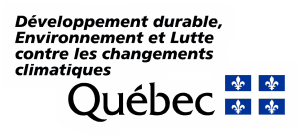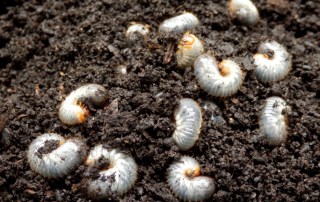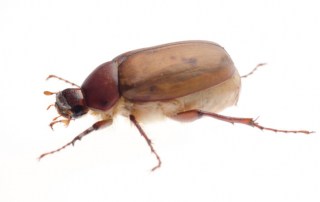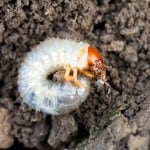Grub Extermination
Whire Grub Problem? Give us a call!
(514) 600-3691
- Contact us for an estimate!
- No danger to your health and pets
- More than 25 years of experience in the field
- 100% effective, long residual
- Fast, discreet and professional service

Free Immediate Quote




WHAT YOU NEED TO KNOW:
Go to our white grub page to learn more about the insect itself.
To find them, often as early as spring, look for patches of dead or yellowed grass that come off the ground easily like a carpet, then take a shovel and dig under the damaged grass. You may also notice small holes in the lawn. If you find more than 5 grubs per square foot, the grubs have settled in and will proliferate. The type of « golf course » grass that people like the most is called Kentucky Paturine, a plant that was imported by the English to mimic the gardens of the castles of England and requires enormous amounts of water to maintain. This plant is also a favorite food for grubs.
If you have decided to use it for your lawn, people suggest that you let the grass grow longer and also water less to try to eliminate them naturally…
Unfortunately, let’s face it: the advice you are given to get rid of grubs naturally is contradictory and will not succeed in eliminating them. The longer you leave the grass, the more water it will need to survive. And if you water less as recommended, it will wither even faster than with grubs.
Some companies also recommend you use nematodes, small insects that are parasitic on grubs. This is interesting on the surface, but the treatments are expensive and depending on how harsh the winters are, they largely die off and don’t kill enough grubs to make a difference.
You should also be aware that Merit©, the trade name for Imidacloprid is the insecticide that most grub treatment companies use to address the problem. It is a member of the neonicotinoid family, a variety of pesticides banned from the European Union because of its terrible effects on bees and other pollinators. This insecticide enters the plants and poisons the insects that feed on them. You are therefore contributing to the destruction of our planet if you use it.
Furthermore, The liquid insecticide used by lawn care companies is not a good solution because rain ( quite frequent in Quebec) dilutes its effect, displacing it on the lawn and making it less effective at the precise place where it was supposed to act.
Bref, the methods you are advised are not good… Don’t use liquid treatments, or imidalcloprid and trust us.
OUR SOLUTION IS BEE SAFE
Act smart and ecologically friendly.
Because of our changing seasons, we understand that it is impossible to ask you to cut your grass longer or shorter and water your lawn more or less from week to week.
We believe in the benefits of insects and do not want to kill bees and other pollinators.
We understand that it would be more practical and environmentally friendly to plant clover instead of your lawn, but let’s face it , you won’t do that and you will be maintaining your lawn…
THEN: We suggest getting rid of your grubs with a smaller dose of a granular residual insecticide, which will gradually dissolve with rainfall in your lawn and degrade in the environment afterwards. It is proven to be safe for bees and we will only spread it in at-risk or affected areas.
Outdoor treatments must be done by experts as they must meet government standards and municipal regulations.
We follow the recommendations of Health Canada and the Quebec Ministry of the Environment to ensure the best possible application of pesticides.
We work for you, and your health is important to us.
We serve the greater Montreal area, Longueuil, Laval, the North Shore and the South Shore.
We also treat all other pest problems ( rodents, ants, cockroaches, bed bugs, wasps, spiders etc)
To learn more about these pests, visit our encyclopedia of parasites.
Free phone quote

We have a local team for all the following regions
Île de Montréal : Baie-D’Urfé – Beaconsfield – Côte-Saint-Luc – Dollard-Des Ormeaux – Dorval – Hampstead – Kirkland – L’Île-Dorval -Île des Soeurs – Mont-Royal – Montréal – Montréal-Est – Montréal-Ouest – Pointe-Claire – Sainte-Anne-de-Bellevue – Senneville – Westmount – Ahuntsic-Cartierville – Anjou – Côte-des-Neiges–Notre-Dame-de-Grâce – Lachine – LaSalle – Le Plateau-Mont-Royal – Le Sud-Ouest – L’Île-Bizard–Sainte-Geneviève – Mercier–Hochelaga-Maisonneuve – Montréal – Montréal-Nord – Outremont – Pierrefonds-Roxboro – Rivière-des-Prairies – Pointe-aux-Trembles – Rosemont – La Petite-Patrie – Saint-Laurent – Saint-Léonard – Verdun – Ville-Marie – Villeray–Saint-Michel – Parc-Extension
Rive-Sud de Montréal : Longueuil – Belœil – Boucherville – Brossard – Candiac – Carignan – Chambly – Châteauguay – Contrecœur – Delson – La Prairie – Longueuil – McMasterville – Mont-Saint-Hilaire – Otterburn Park – Saint-Amable – Saint-Antoine-sur-Richelieu – Saint-Basile-le-Grand – Saint-Bruno-de-Montarville – Sainte-Catherine – Saint-Constant – Saint-Jean-sur-Richelieu – Saint-Isidore – Sainte-Julie – Saint-Lambert – Saint-Marc-sur-Richelieu – Saint-Mathias-sur-Richelieu – Saint-Philippe – Varennes
Rive-Nord de Montréal : Mirabel – Deux-Montagnes – Oka – Saint-Eustache – Pointe-Calumet – Saint-Joseph-du-Lac – Sainte-Marthe-sur-le-Lac – Blainville – Boisbriand – Bois-des-Filion – Lorraine – Rosemère – Sainte-Anne-des-Plaines – Sainte-Thérèse – Mascouche – Terrebonne – Charlemagne – L’Assomption – Repentigny – Saint-Sulpice – L’Épiphanie

